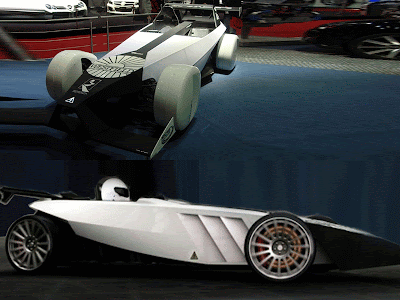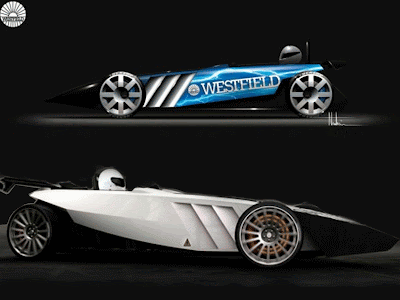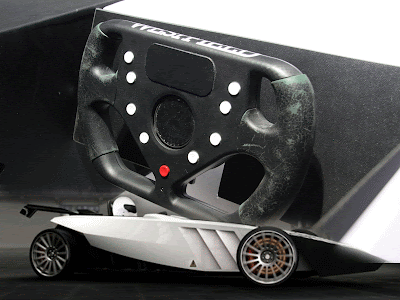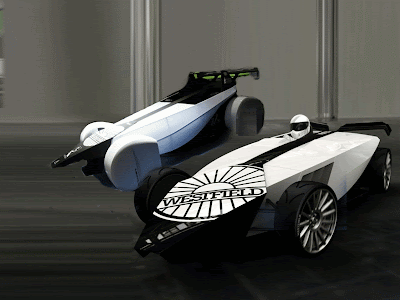
As the exhibitors at Geneva report the Westfield iRacer represents 99% of the production model. Designed by Elliott Hawkins, a graduate from the Royal College of Arts vehicle design course, the iRacer has the pulse of electric power running through its veins. A number of materials including aluminum and recyclable plastics were used for body construction.


iRACER Electric Race Car Westfield Sports Cars Concept
Westfield iRacerReduced fuel consumption and lower emissions are what’s seen a lot these days on the latest production models and concept vehicles. But don’t think that performance will lag for these green cars.
iRACER Electric Race Car Westfield Sports Cars Concept
One prime example is Westfield Sportscars’ iRACER, an all-electric race car created to win competitions. The car’s designer is Elliott Hawkins, a graduate from the world renowned Royal College of Arts vehicle design course. Westfield Managing Director, Julian Turner said that the concept has a bold look and is “99% representative” of the production vehicle. The iRACER uses the following materials: composites, aluminum, recyclable plastics and a stretched lycra skin over an aluminum framework. As a result, the car’s body is lightweight, low-cost, and aerodynamically efficient. Project Manager, Paul Faithfull, said that some materials (like fabric) has major benefits for racing but is obviously unfit for road use. When in a race, it’s of value that the bodywork can change in a few minutes, and that changing the color and sponsors, as well as repairs can be done quickly.


iRACER Electric Race Car Westfield Sports Cars Concept
Created in conjunction with project partners Potenza Technology, Delta Motorsport, RDM Automotive and Coventry University, the iRACER has a 40 kilowatt YASA motor directly turning each rear wheel, which together are said to be good for 200 horsepower at peak output and provide 737 pound feet of torque (1000 Newton meters). Race range is thought to be 50 to 60 miles. As well as a bit of wind tunnel tuning, the team plans to develop independent power delivery to the wheels in an effort to improve performance on the track. Perhaps more controversially, they also intend to devise a new noise generation system that might "give the iRACER aural drama to match both its looks and performance."


iRACER Electric Race Car Westfield Sports Cars Concept
"The use of materials such as fabrics has limited scope for road use, but has major benefits for racing," says Paul Faithfull, iRacer project manager. "Imagine being able to change your bodywork in a matter of minutes, with a new body stretched over the framework, changing the colour, sponsors or just effecting rapid repairs. It is also extremely light compared to almost all alternative materials."


iRACER Electric Race Car Westfield Sports Cars Concept
The concept weighs 600kg (1,323 lbs), is 3.6 metres long and is rear-wheel-driven. Its Lithium Phosphate battery helps the motor make 80kW (109 PS) and 1,000Nm at the wheels. The 0 - 60mph sprint is said to take under 5 seconds and top speed is limited to 177km/h. Westfield reckons a race range of between 80km and 97km (50 and 60 miles) is possible.

iRACER Electric Race Car Westfield Sports Cars Concept
The iRacer will make its racing debut at the EV Cup one-make race car series launching in 2011.


